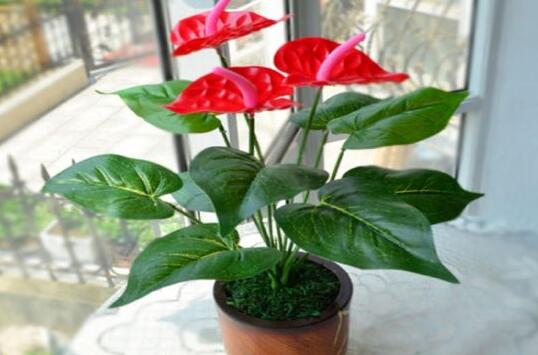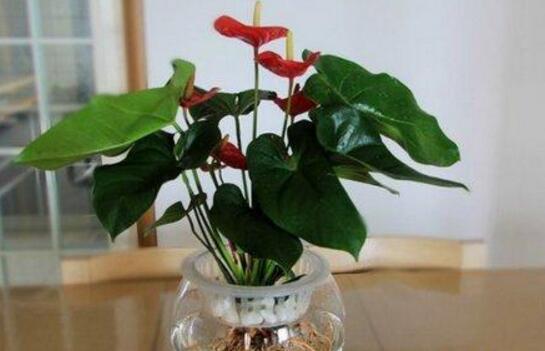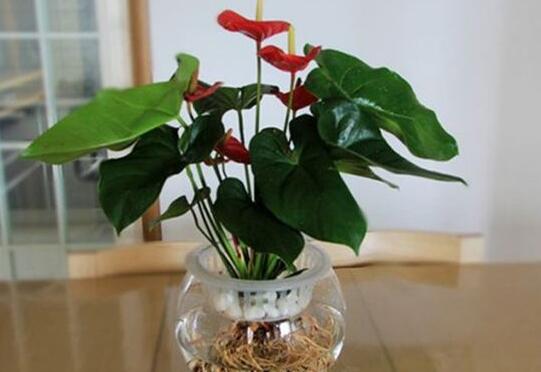How to water Anthurium andraeanum? how often do you water Anthurium andraeanum? you need to master a principle.
Through the cultivation methods and precautions of Anthurium andraeanum, we know that it likes a high humidity environment, so watering becomes particularly important. It is wrong to have poor water quality or to water too much or too little, so how can Anthurium andraeanum be watered correctly? This is what we need to consider.
How to water Anthurium andraeanum

Anthurium andraeanum is a kind of plant sensitive to salt, so the requirement for water quality is relatively high, so how to water Anthurium andraeanum? We understand it in detail from several aspects, such as the choice of water quality, how often to water, the time of watering and so on.
What kind of water is used to water Anthurium andraeanum
1. River water or well water
If there are conditions, you can choose river water or well water, you should water Anthurium andraeanum, it is best to choose the PH value between 5.2-6.1, if the acid water quality will be the flower stem shorter, Anthurium will not look good, the river and tap water do not have this problem.
2. Tap water
What most people can choose is tap water, but tap water is usually acidic, so how to water Anthurium at this time? In fact, it is not without solutions. Tap water can be kept for about 4 days, the chlorine inside will be filtered, its PH value will not be too low, so you can water Anthurium andraeanum.
Second, how often is Anthurium andraeanum watered
Watering needs to be determined according to the growth and climatic conditions of Anthurium andraeanum. How to water Anthurium andraeanum in each season is introduced in detail in the maintenance methods of Anthurium andraeanum in four seasons. Here we will understand how often to water Anthurium andraeanum from seedling stage, big seedling stage and flowering stage.
1. Seedling stage
At this time, the root system of Anthurium andraeanum is not developed, and it itself is not resistant to drought, so watering should not be too frequent, it can be watered every 2-3 days, in principle, it is to keep the soil moist, in order to promote the growth of new roots, do not let the basin soil have stagnant water.
2. Big seedling stage
The big seedling stage is the fastest growing stage of the plant, and the requirement for water is relatively high, so the frequency of watering is relatively high, generally 1-2 days should be watered once, the principle is to water thoroughly.
3. Flowering period
When the flowering time comes, how to water Anthurium andraeanum? The answer is to reduce the frequency of watering, which can be changed into watering every 4-5 days, because at this time it does not require much water and absorbs less water than other stages, so as long as the soil is not hardened.
When is the best time to water Anthurium andraeanum
The best time to water Anthurium andraeanum is when the temperature is 15-20 degrees, that is, in the morning or evening. You should try to avoid watering at noon when the temperature is high and when it is cold.
How long after Anthurium andraeanum was watered?
Changing the basin of Anthurium andraeanum should be carried out every year, so how long should it be watered after changing the basin? Generally speaking, the basin should be watered thoroughly when changing the basin, and then watering should be carried out according to the principle of keeping the soil moist without stagnant water.
How to water Anthurium andraeanum leaves yellowing?
Because of the peculiar flower shape and gorgeous color of Anthurium andraeanum, more and more flower friends begin to cultivate Anthurium andraeanum, but the phenomenon of yellowing of Anthurium andraeanum leaves must be encountered in the process of cultivation. What should we do? Next, I will tell you about the causes and solutions of the yellowing of Anthurium andraeanum leaves, as well as the method of watering Anthurium andraeanum.
How to water Anthurium andraeanum
In order to raise Anthurium andraeanum well, we must pay attention to watering. Improper watering can easily cause the withering or rotten roots of Anthurium andraeanum, affect the normal growth of Anthurium andraeanum, and in serious cases, it will cause the death of the plant.
Water quality selection:
Anthurium andraeanum is a kind of flower species which is sensitive to salt. therefore, the pH value of the substrate should be controlled between 5.2 and 6.1 as far as possible, so that the water quality is the most suitable for Anthurium andraeanum growth. If the pH value is too small, the flower stem becomes shorter, it will reduce the ornamental value. Tap water is suitable for planting Anthurium andraeanum, but the price is expensive; natural Rain Water is the best water source in Anthurium andraeanum cultivation.
Watering requirements:
Potted Anthurium andraeanum has different water requirements at different growth and development stages. In the seedling stage, because the root system of the plant is weak, it is distributed shallowly in the substrate and is not tolerant to drought. After planting, you should spray water 2-3 times a day, always keep the matrix moist, promote its early hair to draw more new roots, and pay attention to the dry humidity of the basin substrate. In the middle and large seedling stage, the plant grows fast, needs more water, and the water supply must be sufficient; at flowering stage, watering should be reduced and phosphorus and potassium fertilizer should be increased to promote flowering.
Water temperature control:
The water temperature of Anthurium andraeanum should be kept at about 15 ℃ (including the nutrient solution), especially in severe cold and heat. The moisture in the medium should not be too wet, because the root of Anthurium andraeanum is semi-fleshy, and there is a large amount of water stored in the body. Too much water in the medium causes hypoxia in the medium, hinders the breathing of the root system, and is in a wet state for a long time, which will cause the root system to rot.
What if the leaves of Anthurium andraeanum turn yellow?
1. Lighting
Anthurium andraeanum is a tropical flower that likes high temperature and cold, likes shade and avoid sun, likes dampness and avoids drought. At ordinary times, you should be careful not to be exposed to the sun, do not put it in an environment with strong direct sunlight, but should not be placed in a dark room for a long time, but should be placed in a bright place with scattered light. When the light is relatively strong or too weak, the leaves will turn yellow and wither.
2. Watering
Anthurium likes a moist environment, but it is not resistant to waterlogging. If it is watered too often, the roots of Anthurium andraeanum have difficulty in breathing and lack of nutrition, resulting in yellowing leaves. Water and fertilizer management should be appropriate. Anthurium andraeanum is a kind of flower which is sensitive to salt. the less salt in water, the better. Natural Rain Water is the best water source in Anthurium cultivation. Dry and then water, water thoroughly. I don't know how long your Anthurium andraeanum has been bought, but the yellowing of the leaves may be the reason why they are not dry and watered too often.
3. Fertilization
Fertilization should not be too thick, should be fully water-soluble fertilizer irrigated basin soil, can not apply general chemical fertilizer, because Anthurium can not be absorbed, will produce fertilizer damage. If Anthurium andraeanum is fertilized too much, it will lead to changes in soil pH value. Anthurium andraeanum is more sensitive to this and is prone to uncomfortable symptoms. Causing the leaves to turn yellow.
Anthurium andraeanum is a kind of flower species which is sensitive to salt. therefore, the pH value of the substrate should be controlled between 5.2 and 6.1 as far as possible to optimize the growth of Anthurium andraeanum. If the pH value is too small, the flower stem becomes shorter, it will reduce the ornamental value. In addition, Anthurium andraeanum needs to be fertilized in about two months, and the leaves may turn yellow without fertilizer. It is best to use special fertilizer for Anthurium andraeanum when fertilizing, and regular manufacturers will mix fertilizer when buying Anthurium andraeanum. The growth temperature of Anthurium andraeanum should not be lower than 15 ℃, otherwise the leaves and stems are easy to turn black.
4. Diseases and insect pests
For example, yellow spot and withered leaves can be sprayed with 800 times of carbendazim wettable powder; red spiders and shell insects can be prevented and treated with special agents, or wiped with a dishcloth and rinsed with clean water.
Leaf blight nematode is caused by nematode infection of the genus nematode, mainly infecting roots and leaves. The disease is characterized by the formation of necrotic spots or brown spots along the veins, the root is enlarged, and finally the whole leaf dries up. The main purpose is to strengthen seedling quarantine, select robust seedlings and do a good job in the disinfection of cultivation substrate.
The above is how to water Anthurium andraeanum, and Anthurium andraeanum leaves yellowing how to do some answers, hope to help you, more household knowledge please pay attention.
How often do you water Anthurium andraeanum? points for attention in changing pots.
For Anthurium andraeanum and other family-farmed plants, water is a very key part, because family-farmed plants are rarely able to absorb the water and nutrients they need through natural phenomena in the natural environment, so it is very meaningful to water them at the right time to create a simulated natural environment.
How often is Anthurium andraeanum watered?
Anthurium andraeanum can not be watered too much, it is easy to rot roots, rotten roots will die, watering every 3-4 days, every time you see water dripping from the bottom of the flowerpot.
Points for attention in changing pots of Anthurium andraeanum
1. Choose soil for preparing pots for red palm.
First of all, prepare the pots to be changed. The editor wants to plant two pots separately, so he prepares two small pots. Put the soil in the flowerpot and choose the soil rich in humus. Soak the soil in water and pick up the finer parts with a sieve. This kind of soil has better drainage.
2. Anthurium andraeanum de-pots
Remove the plant from the pot, remove the excess soil from the roots, and trim the roots to remove the old roots and decaying parts of the plant. Put the plant in a cool place to dry, conditional disinfectant can be used for disinfection.
3. Anthurium andraeanum on the basin
The editor has an exclusive secret to enable Anthurium andraeanum to grow healthily after changing pots. Prepare two transparent plastic levels and punch several holes in the bottle. Then buckle the bottle in the pot soil and place it in the middle or on the left, as long as it doesn't interfere with the plant. This is a good drain cover to drain the stagnant water from the basin. When the drain cover is ready, you can put the plant into the basin and add soil. Got it.
After changing the basin, first put the plant in a cool place to take the basin, more plants adapt to the new basin after normal maintenance, be careful not to water too much.
The mode of reproduction of Anthurium andraeanum
1. Branch propagation of Anthurium andraeanum
Anthurium andraeanum has a strong tillering ability, the small and medium-sized lateral buds on the plant are separated from the mother, and the lateral buds are slowly cultivated into new plants. The specific methods are as follows:
1. Determine the time
The ramet period is mainly in the cool and humid spring, and it can also be divided in the cool and cool weather in autumn. Never split in a hot summer or in a dry and cold season.
2. Select lateral buds
When selecting lateral buds, we should pay attention to the principle of not harming the mother plant, that is, too large lateral buds, too tight lateral buds, and too weak lateral buds. The main lateral buds are relatively easy to separate from the mother plant and are more robust, with at least two main roots or more.
3. Ramet disinfection
There are two ways of ramet, which can be broken manually or removed with a blade. After dividing the plants, the small plants were disinfected.
4. False planting and rooting
The cut lateral buds were planted in a cool place after the wound was slightly dried to promote root and restore growth. It can be planted after taking root. When planting, the root system should be flattened, the plant should be upright, it should be supported if necessary, it can not be watered immediately after planting, it can be sprayed to the leaf surface to maintain humidity, and watering or thin fertilizer solution can be applied according to the situation after 2 days.
2. Sowing and propagation of Anthurium andraeanum
Sowing is the main way to obtain new varieties. The fruits of Anthurium andraeanum are berries and need to be sowed as they are picked.
1. Seed treatment
Freshly picked fruit, remove the peel, wash off the pulp, to avoid pulp rot affecting seed germination. Of course, if you buy seeds from a florist, this step can be omitted.
2. Sprouting
Using the method of accelerating germination, the seeds are sown in clean river sand with a depth of 0.5-0.8 cm to ensure a certain soil moisture. It will germinate in about 15 days, and new leaves will grow quickly.
3. Transplanting
When the seedlings have 5 or 6 leaves, they can be transplanted into a pot and mix perlite and peat soil at 1:2.
Pruning method of Anthurium andraeanum
1. In the process of plant growth, if it is found that the petiole begins to degenerate step by step, or the leaves become dry, they can be cut off in time.
2. If the pedicel turns yellow after flowering, it should be pruned as soon as possible. Specifically, just cut it from about two centimeters from the base.
3. In addition, it is necessary to cut off the senescent branches, the branches that have caused diseases and insect pests, and the yellow and weak branches before the winter. Such a proper pruning will make the growth in the coming year better.
4. Also, in order to make the whole shape neat and tidy, we can also carry out it according to the specific situation. For example, cut off branches that are too curved and creeping.
The cultivation of Anthurium andraeanum not only needs to provide proper water, but also needs to master some important growth links, such as basin change, reproduction, pruning and so on, so that the Anthurium andraeanum in our home can become more dynamic and full of vitality. Therefore, friends who have raised Anthurium andraeanum should learn more!
- Prev

Four seasons maintenance method of Anthurium andraeanum, control light / temperature / learn to put it in the right position
The temperature and humidity will be different in different seasons, so when raising Anthurium andraeanum, the maintenance method of each season is different, so what is the maintenance method of Anthurium andraeanum in the four seasons? Next, we will introduce in detail from the four seasons of spring, summer, autumn and winter. The maintenance method of Anthurium andraeanum in the process of planting Anthurium andraeanum
- Next

How to cultivate Anthurium andraeanum in hydroponic culture, the method of hydroponic culture / water exchange and water temperature are very important.
Anthurium andraeanum is a kind of plant that likes wet environment, so many people want to plant it in hydroponics. Can Anthurium andraeanum be hydroponically cultivated? How to cultivate Anthurium andraeanum in hydroponics? Today, the editor will teach you the method of hydroponic culture of Anthurium andraeanum and the daily maintenance after hydroponics. Can Anthurium andraeanum be hydroponically cultured? in the effect of Anthurium andraeanum
Related
- Fuxing push coffee new agricultural production and marketing class: lack of small-scale processing plants
- Jujube rice field leisure farm deep ploughing Yilan for five years to create a space for organic food and play
- Nongyu Farm-A trial of organic papaya for brave women with advanced technology
- Four points for attention in the prevention and control of diseases and insect pests of edible fungi
- How to add nutrient solution to Edible Fungi
- Is there any good way to control edible fungus mites?
- Open Inoculation Technology of Edible Fungi
- Is there any clever way to use fertilizer for edible fungus in winter?
- What agents are used to kill the pathogens of edible fungi in the mushroom shed?
- Rapid drying of Edible Fungi

